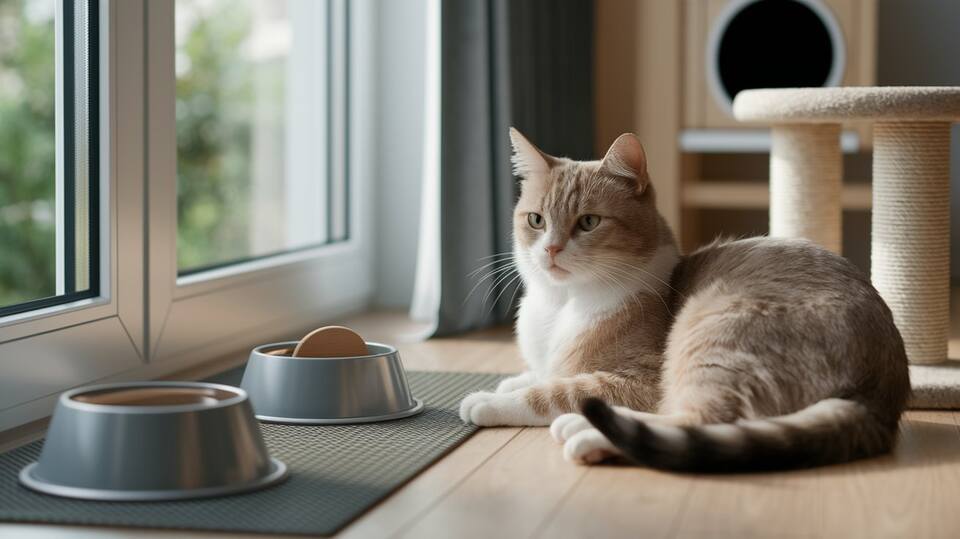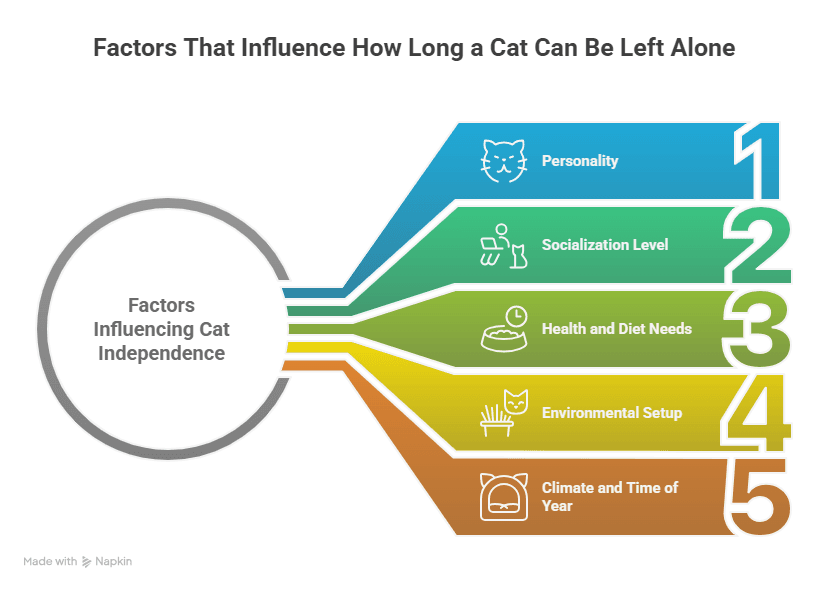
Introduction
Cats have a reputation for being independent, low-maintenance pets. Unlike dogs, they don’t need to be walked or constantly entertained… right?
Well, yes—and no.
While cats are generally more self-sufficient than dogs, that doesn’t mean you can just leave them home alone for days at a time without consequences. Like any companion animal, cats require food, water, mental stimulation, and emotional care. So naturally, one of the most common questions cat owners ask is:
“How Long Can You Leave a Cat Home Alone?”
In this guide, we’ll cover:
- How long cats can stay alone by age
- What affects how well they handle being alone
- How to prepare your cat for short or extended absences
- When a sitter or extra help is needed
- Signs of stress or separation anxiety
Let’s get into it.
Are Cats Really That Independent?
Yes, cats can manage themselves better than some pets—but they’re not as emotionally disconnected as many people think.
Here’s what’s true:
- Cats don’t need constant supervision
- They can entertain themselves for short periods
- They’re typically fine using the litter box without outdoor breaks
But here’s the catch:
- Cats are routine-oriented and territorial
- Many form strong emotional bonds with their humans
- They still need fresh food, water, and clean litter daily
- Loneliness and boredom are real concerns—especially for indoor cats
So yes, cats can stay alone longer than dogs, but they still have limits.
How Long Can You Leave a Cat Home Alone? (By Age)
🐾 Kittens (Under 6 Months): 4–6 Hours Max
Kittens need:
- Frequent feeding (every 4–6 hours)
- Supervision for safety (they’re curious and clumsy!)
- Social interaction and play
👉 Leaving a kitten alone all day or overnight can lead to health risks, anxiety, and behavioral issues.
🐱 Young Cats (6 Months–1 Year): Up to 8–10 Hours
Older kittens can tolerate a full workday if:
- They have food, water, and toys
- The environment is kitten-proofed
- You spend time with them before and after work
Overnights are not ideal unless you have someone to check in.
🐈 Adult Cats (1–7 Years): Up to 24–48 Hours (With Prep)
Healthy adult cats are the most self-sufficient age group.
If you:
- Leave enough food and clean water
- Scoop the litter box beforehand
- Provide stimulation (toys, window access, etc.)
They can typically be alone for a full day, and in some cases, up to two days.
But longer than that? You’ll need a backup plan.
🧓 Senior Cats (7+ Years): Varies Widely
Older cats may:
- Require medication
- Have mobility issues
- Be more emotionally sensitive
- Eat smaller, more frequent meals
Some seniors are fine alone for 24 hours; others need check-ins even if you’re gone for just the afternoon.
Factors That Influence How Long a Cat Can Be Left Alone

No two cats are the same. Here’s what affects their tolerance:
🧬 1. Personality
Shy, anxious, or clingy cats may struggle more when left alone.
Independent or aloof cats may not even notice you’re gone.
🐾 2. Socialization Level
Cats that are used to being around people all day may feel more lonely.
Well-socialized cats who’ve had time alone before adjust better.
🐈 3. Health and Diet Needs
Cats with:
- Special diets
- Medications
- Kidney disease or diabetes
Should not be left unsupervised for long.
🛋️ 4. Environmental Setup
A cat with:
- A clean litter box
- Access to windows or perches
- Toys or enrichment
Will fare much better than one stuck in a dull, closed-off room.
☀️ 5. Climate and Time of Year
- In hot weather, a broken A/C can be deadly.
- In winter, heat failures could be dangerous.
Always consider the season when making plans.
Is It Safe to Leave a Cat Alone Overnight?
In most cases—yes, if:
- They’re healthy and over 1 year old
- You’ve left enough food and clean water
- Their litter box is clean
- The space is safe and ventilated
But keep in mind:
- Accidents happen (spilled water bowls, clogged litter boxes)
- Cats can get anxious or bored, especially if you do this often
If your cat has health concerns or is emotionally sensitive, try to avoid leaving them alone overnight without someone checking in.
Can You Leave a Cat Alone for a Weekend?
Short answer: Not recommended.
Even though some adult cats may physically be okay for 48 hours, emotionally and practically, it’s risky.
Here’s why:
- Food may go stale or run out
- Water bowls can tip over
- Litter boxes can overflow
- Behavioral issues (scratching, howling, accidents) may develop
- Emergencies can occur with no one to help
👉 If you’re gone for more than 24 hours, arrange for a pet sitter or friend to check in daily.
Can You Leave a Cat Alone for a Week or Vacation?
No, not without proper care.
Here are your options:
- Hire a professional cat sitter
- Ask a friend or neighbor to drop in daily
- Use a cat boarding service
Even the chillest cat shouldn’t be left alone for more than 48 hours without human contact.
How to Prepare Your Cat to Be Left Alone
Whether it’s for 6 hours or 2 days, the key is preparation.
✅ 1. Food and Water
- Use automatic feeders for timed meals
- A water fountain is better than a bowl—it encourages hydration and reduces spill risk
- Leave a backup bowl in case the fountain fails
✅ 2. Clean and Accessible Litter Box
- Clean thoroughly before leaving
- Add an extra box if you’ll be gone for more than a day
- Keep boxes in low-traffic, familiar areas
✅ 3. Enrichment and Comfort
- Rotate toys so they feel new
- Leave puzzle feeders or treat toys
- Open curtains so they can watch outside
- Play calming music or cat TV videos
✅ 4. Safety-Proof Your Home
- Remove toxic plants, strings, or plastic bags
- Secure cabinets and doors
- Unplug unnecessary electronics
✅ 5. Use Pheromones or Calming Aids
- Plug-in diffusers like Feliway can help reduce anxiety
- Some cats respond well to calming collars
When to Call a Cat Sitter (and What to Look For)
For anything longer than 24 hours, a sitter is ideal.
Look for someone who can:
- Visit at least once a day
- Check food, water, and litter
- Give medication if needed
- Spend time playing or cuddling (if your cat is social)
Always do a meet-and-greet beforehand and leave detailed instructions.
What About Getting a Second Cat?
Adding a feline friend might seem like a great way to reduce loneliness—but it depends.
Pros:
- Companionship
- Mutual play and enrichment
Cons:
- Not all cats get along
- Introduction process takes time
- You may be doubling the care responsibilities
Only consider a second cat if you’re ready to commit to both.
Signs Your Cat Was Stressed While You Were Away
Look for these clues that your cat didn’t handle your absence well:
- Excessive grooming
- Clinginess or hiding
- Not eating or overeating
- Litter box accidents
- Destructive behavior (scratching furniture, knocking things over)
If this happens often, your cat may be experiencing separation anxiety—and it’s time to adjust your approach or talk to your vet.
FAQs
Can I leave two cats alone longer than one?
Yes, two cats often keep each other company—but you’ll still need someone to check food, water, and litter.
Should I leave lights or TV on for my cat?
Leaving a soft light or low-volume TV or radio can offer comfort and mask outside noises.
How do I know if my cat is okay alone?
They eat, use the litter box, and behave normally when you return. If they’re clingy, destructive, or hide—consider shorter absences or more visits.
Is it safe to leave kittens alone overnight?
No. Kittens under 6 months should not be left alone for more than a few hours due to their dietary and social needs.
Also Read - Why Do Cats Twitch in Their Sleep? Understanding Your Cat’s Dreamy Movements
Conclusion
So, how long can you leave a cat home alone?
It depends on their age, health, personality, and environment. While adult cats may handle a full workday or even an overnight stay alone, anything longer than 24–48 hours requires human support.
With thoughtful preparation, you can keep your cat:
- Comfortable
- Stimulated
- Safe
Even when you’re not home.
Whether you’re running errands, working late, or planning a weekend getaway, always make your cat’s well-being a top priority, and they’ll be just as happy to see you come home as you are to be back. 🐾




